#Pacific Rim was a love song to the mecha genre
Explore tagged Tumblr posts
Text
I feel like it's gonna be a challenge for the new Voltron live action movie to top the mecha design in Pacific Rim (2013). But if they can make the Voltron mecha look half as cool as the mechas in the first Pacific Rim movie, I'll probably watch it

#Voltron#Pacific Rim#Pacific Rim was a love song to the mecha genre#So I'm actually kinda curious about how the Voltron team will design the lions#Voltron could look either really cool or be extremely cringe#my expectations for this movie overall are pretty low but please for the love of god let the mecha be badass at least#Anyone else thinking they'll watch this thing when it comes out?
71 notes
·
View notes
Note
1, 8, 13, 22, aaand i forgot so random numbers, 38 and 44!
1. Who is your favourite ghost?
I love them all of course but it���s gotta be either Mary or The Captain
8. Which ghost do you think you'd get along with the best?
Honestly maybe Robin? Mary is a solid contender as well, and she wouldn’t try and get me to play chess. I’m really bad at chess
13. Favourite ship and why?
Mike and Alison, they’re so sweet and they care about each other so much and i just LOVE THEM
22. What is something you're hoping to see in a future series?
Robin flashbacks! Would love to see the rest of the gang play cave people, and I really want to know what’s kept him hanging around Button House for thousands of years
38. It's your turn to pick a movie for film club! What are you watching?
Pacific Rim 100%. Kitty would love the “power of love” robots, Pat would like the teamwork and would probably recognize the mecha/kaiju genres from movies/shows he watched while alive, Robin and Mary would get a little too invested in the battle sequences, and the Captain would be a big fan of Pentecost and try to pass it off like he admires his military prowess and leadership. Julian badmouths all the dumb politicians who try to build a wall instead of investing in the Jaegers as if he wouldn’t have done the same.
44. Tell me a song you think [insert character name here] would like, or a song that reminds you of them!
oh i have PLAYLISTS. uhh just gonna pick one at random. Sweet Tooth by Cavetown for Thomas – I think he’d like the style and the lyrics remind me of him.
2 notes
·
View notes
Text
Gaming: About Me
I was tagged by @idrelle-miocovani (thank you lovely!)
Fave game of the past five years?
Oof I gotta go with a couple: the Dragon Age series, and Fallout games. I’ve always known about the Fallout games, but getting into them wasn’t something I did until recently. I’ve really enjoyed Monster Hunter: World too. Dragon’s Dogma! Gosh, I love that game.
Most nostalgic game?
The Harvest Moon series of games. I played them on the Game Cube and on the Wii as well. I spent days at a friend’s house playing Harvest Moon because I loved it so much. Also pokemon too. That game gives me a lot of nostalgia of long car rides to visit relatives.
Game that deserves a sequel?
Not necessarily a sequel, but I want more of west coast Fallout. New Vegas is so cool and interesting and I want more about it, especially after the choices you make in New Vegas. That or I want a true canonical Fallout game in the Midwest USA.
Game that deserves a remaster?
Dragon age Origins, the Mass Effect Trilogy and Fallout: New Vegas. They all have such good stories and they deserve better graphics. Also Dragon’s Dogma; it’s a beautiful game as it is right now, but it could use a refresher.
Fave game series?
Ooof I gotta go with the Dragon Age series TBH. It was first big getting back into playing video games and I’ve never looked back. It’s inspired me to get back into writing and improving my own art practices.
Favorite genre?
RPG, hands down. I love making characters and seeing the worlds that they inhabit.
Least favorite genre?
Shooters like Call of Duty or MMORPG games. I’m chill with Monster Hunter World because the multiplayer is optional and the community I’ve had experiences with has been mostly good. But beyond that I’m not into the toxic community of shooters or the grieving and trolling of big multiplayers like Grand Theft Auto or WoW
Favorite song from a game?
I love Journey to Skyhold from Dragon Age Inquisition. Just like the cutscene, the song has a very special place in my heart. That and The Inquisition Marches and Return to Skyhold.
I love love love Our Island from the Fallout 4 DLC Far Harbor. That whole DLC is my favorite one of the lot of them just from the atmosphere and the story of it. The whole soundtrack is really my favorite; I could listen to it all day.
Also the whole of the Dragon’s Dogma soundtrack. I could listen to it allll day.
Favorite character from a game?
Gonna go with from each franchise I love because I can’t pick:
1. Dorian Pavus (Dragon Age: Inquisition)
2. Iron Bull (Dragon Age: Inquisition)
3. Fenris (Dragon Age 2)
4. John Hancock (Fallout 4)
5. Robert Joseph MacCready (Fallout 4)
6. Veronica Santangelo (Fallout: New Vegas)
7. Joshua Graham (Fallout: New Vegas)
8. Savan (Dragon’s Dogma)
9. Mercedes (Dragon’s Dogma)
Favorite ship from a game?
I got some faves from each of the games too!
1. Dorian & Inquisitor (Dragon Age: Inquisition). Straight up OTP it had to pick one.
2. John Hancock & SoSu (Fallout 4) or make everything explode ever power couple
3. Arcade & Courier (Fallout: New Vegas). He talks about a nice bachelor sweeping him up and we can’t?? For shame.
But beyond that I love most ships honestly. :)
Favorite voice actor from a game?
Ooof I don’t think I have a favorite tbh. Two that readily come to mind are Mathew Mercer and Troy Baker, but beyond that I don’t pay that much attention to the voice actors as they cross genres in media; it’s kind a like a surprise each time I find them. Like how with Dragon’s Dogma I “returned” to my anime roots when I latched onto Valmiro who is voiced by Vic Mignogna who plays Edward Elric in Fullmetal Alchemist. I still like the character a lot, but it’s like wowza I didn't make the connection.
Favorite cutscene?
I’m a huge sucker for the Journey to Skyhold cutscene. I’ve watched it half a dozen times, but I still get shivers. Also with the Arbor Wilds cutscene too. I also love the opening sequence in Fallout New Vegas and Fallout 4. I love love love the ending sequences in Dragon’s Dogma too, especially when I played them for the first time. It’s such a big revelation and so many emotions.
Favorite boss?
I love the Corphyeus fight from DA2. It was a complex multi stage fight that is exactly my taste. I also LOVE the Xeno’jiva fight from MHW. That is a fun and challenging fight to end a whole lot of big fights. It wasn’t a hard boss, but I loved fighting Savan at the end of Dragon’s Dogma. It wasn't high stakes in that you could die, but the emotional weight of it.
First console?
Game Cube or PC (Windows 95).
Current console(s)?
Xbox one and Xbox 360
Console you want?
I want a PlayStation 4 and a nice gaming computer. But money...
Place from a game that you’d like to visit?
I would like to visit the Mojave Wasteland. It’s super cool looking even though everything is murderous. Wouldn’t wanna live there though.
Place from a game that you’d like to live in?
Thedas or the world in Monster Hunter. Both are gorgeous. I’d probably live in a Free Marches state as a baker/artist in Thedas or a researcher in Monster Hunter.
Ridiculous crossover that would never happen but would be super fun?
Fallout and Dragon Age! I wanna see how the companions work in the Wasteland. Like Sera being a trickster in large cities, cutting down the assholes who try to exploit the poor people. Solas being a wandering man, looking for old war tech to try and reverse the effects of the war no matter what. Vivienne as a powerful member of one of the groups in New Vegas, always looking to do better. She would throw the best parties. Cullen is a disillusioned General trying to do better by the world and himself.
It could be grand.
Book that would make a good game?
Mmmm, I don’t know, to be honest. The kind of books I like to read wouldn't make good games, sorry. (I read a lot of psychology books and books that just wouldn't make good games).
Show/movie that would make a good game?
Pacific Rim. Fighting monsters in a giant mecha but it’s also an RPG game? I would be in heaven if that was a game.
Game you want to play?
I want to play the first two Fallout games just to see the hype of the franchise. I also want to play Detroit Becoming Human or at least watch some of it to get a feel for it. I’d also like to play the other Monster Hunter games and revisit old Game Cube games like the Pokemon and Harvest Moon titles.
Have you gotten 100% completion in a game?
I can say in confidence that I have 100% completed Dragon Age Inquisition twice now, I think. I’ve done every side quest, gotten all the mosaic pieces and picked up all the shards. Last time I played, I finished Trespasser at over a 100 hours which included both The Descent and Jaws of Hakkon. I regularly enjoy completely finishing everything in the game; I am all about finishing all of a game. Next, I wanna complete Fallout 4 as much as I can considering that there are never ending quests in the game. I did finish the main part of the game, but I wanted to start over again. Now I’m slowly working towards the end of the game and spending an godly amount of time building settlements.
Have you cried over a game?
Yes, I have gotten teary over a game. Inquisition has gotten me teary; talking to Dorian after his personal quest gets me every time, especially when he says he wouldn't like the person he would become if his father went through the ritual. It strikes a cord with me as a queer person quite a bit in how that I wouldn't like the person I would be if I was queer.
Nick’s dialogue in Fallout 4 after you complete his personal quest gets me all choked up. He’s got this idea that he can shake off who human Nick is by finally finishing what he started, but it doesn’t. What he does now, who he is and what he’s made of himself is entirely his own and that’s what makes him a person.
I wanna say I got teary eyed over the end of Honest Hearts from Fallout New Vegas. Scratch that, the whole DLC has moments that made me emotional. I love Graham and Daniel and how they do tie back into the main story of the game and give us more background on things like Graham as Caesar’s Legate and the sacking of New Canaan. I cried over finding the Survivalist Caches and reading about this man who survived the falling of the bombs to make something of a life for himself in Zion. The area is just so pretty??? Like Zion in the game is gorgeous. The ending made me teary when Graham talks about his revenge and how he knows he’s doing it for the wrong reasons; he knows he’s using God as a shield so he doesn’t have to take accountability for his actions. By the Courier’s words he can show mercy and for once not give into revenge and violence. Also how he talks about how love saved him and not just God’s love—but the love of his people. He did terrible things as Legate, but when he went back to New Canaan, they still accepted him and loved him. He survived getting thrown into the Grand Canyon because of love. That shit gets me emotional as shit.
I’m going to tag: @nbtakumi, @ryanglitter, @pavustive, @smolpocketmonstercoffee and anyone else who wants to do this! Consider yourself tagged! (Also no obligation to do this if you don’t want to!)
#thank you for the tag!#this was a fun meme#and I got to ramble a bit about things#I'm waiting for moments in new vegas that are going to make me cry because I know they are going to happen#edit: i made some corrections and fixed other bits
8 notes
·
View notes
Text
Pacific Rim Uprising: A Comparative Review
A miracle has occurred. Pacific Rim, the brainchild of Guillermo del Toro that bombed in the US but soared internationally for a total box office gross of $400 million, has, against all odds, managed to get a sequel. Am I dreaming? Pacific Rim: the movie (and now franchise) that could.
But though the existence of a follow-up to this underdog of a movie (if a Hollywood blockbuster can be called that) is certainly miraculous, we must ask ourselves if a greater miracle has occurred: Is Pacific Rim Uprising actually good?
The answer is no… and yes. Wait, let me be clearer. This is a bad movie… and I dug it. OK, this is still confusing. I guess ‘patchy’ is the most accurate word here. The patches mostly consist of giant gaping holes of badness, but there are patches of (relative) goodness.
Let’s get this out of the way: Uprising is, in most ways, not the Pacific Rim we know and love. Set 10 years after the first, sporting a new director along with an almost entirely new cast, it is unmistakably a departure from the first one. Yes, it still has giant robots and giant monsters and they do indeed punch each other, but it is a fundamentally different movie in so many ways that it isn’t really surprising to find that something essential has been lost in the sequel.
I almost feel bad comparing Pacific Rim Uprising to its predecessor. As special as Pacific Rim was, I do typically believe that movies should be judged on their own merits… but it is a sequel and such comparisons are inevitable, so screw it, I’m doing it anyway.
Before we can unpack what Pacific Rim Uprising lacks, we first need to understand what made Pacific Rim so beloved.
Pacific Rim was special from the start. Guillermo del Toro, a man who has made a career out of penning revisionist love letters to cherished nerd genres, somehow managed to get 200 million dollars to make a big budget ode to monster movies and mecha anime. This once-in-a-millennia, stars-aligning act of providence made Pacific Rim, from its inception, something to behold and treasure.
But to suggest that the improbability of Pacific Rim’s existence is what makes it so special, is to do a disservice to Guillermo Del Toro and the film he created.
On a purely surface level, Pacific Rim has some of the most striking visuals of an action movie in recent years. Pacific rim could have just skated by on the novel prospect of trashy anime and B-movie visuals paired with the polish of a Hollywood blockbuster. Instead, Guillermo del Toro paired this already enticing spectacle with what can only be described as an explosion of saturated rainbow. In a time when The Dark Knight-inspired grey was the norm, Pacific Rim was a sweet, candy-coloured treat for sore eyes. I would even argue that the neon wonder of Guardians of the Galaxy and Thor: Ragnarok have the bravery of Pacific Rim’s psychedelic colour palette to thank.
But the uniqueness of Pacific Rim goes much deeper than its admittedly stunning surface. What makes Pacific Rim stand, maybe not above, but most definitely apart from the crowd, is tone and theme.
At its heart, Pacific Rim is a silly movie. Its premise is ridiculous, its spectacle is over the top, it’s big budget, b-movie, anime trash. In the hands of a lesser director *cough Steven S. Deknight cough* this kind of movie would most likely be couched in a form of defensive snark and detached irony, as if embarrassed by its own frivolousness; the implication being that a movie like Pacific Rim is an indulgence we can partake in, but only if we feel guilty about.
This is what makes Pacific Rim so refreshing; it isn’t ashamed of itself. Every ridiculous line, every overwrought emotion, every heroic sacrifice and every earnest declaration, contains not one ounce of shame or cynicism. Instead, Pacific Rim oozes self-love, pride and, perhaps most unexpectedly, gravity.
There is always an urge to dismiss the often-simplistic conflicts and relationships we see in movies like Pacific Rim as mindless fluff, but Pacific Rim just won’t let you. Every part of this movie is delivered with a feeling of weight and import. An elbow rocket may at first seem like a throw-away sight-gag, but honestly, Pacific Rim takes Jaegers, and, by extension, their elbow rockets, seriously and you should too. They are trying to cancel the apocalypse and you need to get on board.
In this way, Pacific Rim doesn’t just make sure you get invested in the movie’s characters, robots, monsters and endlessly goofy dialogue; it makes sure you respect it.
And honestly, as much as I’ve been playing up the more outlandish parts of Pacific Rim’s premise, it’s hard not to respect the truly weighty and revolutionary ideas that Pacific Rim contends with. Its central conceit shows every nation banding together to save the world in a utopian vision of internationalism and global co-operation. Its puppy dog-like characters love each other with all their heart seemingly from the second they meet, truly trusting each other with theirs lives and innermost self. Its Jaegers are literally powered by emotional understanding and compassion between human beings. Every part of Pacific Rim expounds a far too rare faith in humanity’s potential for positivity, idealism and empathy.
In a movie ostensibly about revelling in the apocalypse, Pacific Rim was, in actual fact, creating a utopia by showing us how humanity’s fundamental goodness could save the world. So needless to say, it is deeply disappointing to find that these things that made Pacific Rim so memorable and, dare I say, important, have been abandoned by the sequel.
The most obvious change is, unsurprisingly, the visual style, as the rainbow extravaganza of Pacific Rim is traded in for the grim, muted greys of reality. To be fair, Pacific Rim Uprising is not entirely devoid of colour, but it isn’t soaking in it like the first film.
In the scheme of things, it’s not a devastating loss, but it is indicative of Pacific Rim Uprising’s biggest problem: its decision to trade in the flavour and uniqueness of Pacific Rim for the bland, the generic and the safe.
Thematically, the internationalism of the first movie is still present implicitly in the diversity of its cast, but the unique positivity and unabashed idealism of the first film has been abandoned. Ideas of empathy and interpersonal relationships are inextricably woven into the premise of Pacific Rim, but these elements never really congeal into any coherent message or ideology; it has lost the unique voice and lofty ambitions of Pacific Rim, so it never feels like Pacific Rim Uprising is trying to say anything other than ‘friendship is good’ and ‘let’s save the world’.
Tonally, the child-like sincerity and self-respect of Pacific Rim has been replaced by generic snark and detached “edgy” humour. Mostly, this tonal shift is just boring and predictable – scenes play out emotionally like you’d expect, characters react with defensive sarcasm and contempt, the humour is crude and forgettable. It plays like a typical, middle of the road blockbuster, content in its mediocrity.
To be fair, it doesn’t not work, it mostly just exists, but it also leads to some bewilderingly bad choices when it comes to humour, especially when it involves the younger members of the cast. A joke about a cadet’s plastic surgeon father goes on for far too long and somehow, in 2018, the triumphant blast off for battle is accompanied by, of all things, the Trololol song.
That’s not to say all the sincerity or joy has been lost – a scene where the team bands together to rebuild their Jaegers hits the right blend of cheesy and awesome, and Jake and Amara’s bond is, at times, quite sweet but in the context of such a snide movie, these glimpses of sincerity seem awkward and unnatural.
Let me put it this way. In Uprising, a Jaeger, the awe-inspiring feat of human ingenuity and mechanical embodiment of empathy and co-operation, flips a kaiju the bird. This is the what Pacific Rim is now.
It’s appropriate that Pacific Rim Uprising shifts the focus to a younger generation of cadets, because Uprising kind of reminds me of being a teenager. It wants so badly to be detached and cool, but it’s far too desperate and unsure of itself to ever truly be considered ‘hip’; it embodies that awkward teenage posturing we all thankfully escape in adulthood. Contrastingly, Pacific Rim exudes the confidence of an adult, secure in their interests and themselves, and in that, effortlessly achieves the coolness Pacific Rim Uprising so desperately seeks.
By now, I think I’ve made it clear that Pacific Rim Uprising is pretty bad, but the thing is, I actually do think there’s some good in here!
But before I get into that, we need to once again, return to the original Pacific Rim, because I haven’t been entirely honest in my assessment. Though my glowing praise at the beginning of this review may suggest an intense, fangirl-ish love of Pacific Rim, in all honesty, I actually don’t like it that much. I appreciate it, I respect it, and I do enjoy parts of it, but there are fundamental flaws that prevent me from truly loving it, specifically, character and plot.
When it comes to Pacific Rim’s characters, the word patchy once again comes to mind. There is some genuinely strong character work in this movie - Mako Mori was rightfully praised at the time for being a well-rounded and interesting female character with a character arc separate from the men around her – and then there is some bafflingly incompetent character work, namely, Raleigh, the protagonist of the film, is fundamentally uninteresting.
Part of this can be attributed to the dearth of charisma that is Charlie Hunnam who seems unable to imbue Raleigh with any emotional depth, but even setting this bland performance aside, Raleigh just feels like countless other mediocre male leads. He’s got a tragic backstory related to a dead family member that he still hasn’t gotten over and he needs to learn to let someone else into his heart before he can save the world; I’ve seen this plot in most uninspired video games.
But to be fair, just because this setup is cliché doesn’t mean it couldn’t have been interesting; Pacific Rim is, in many aspects, an example of this, elevating classic genre tropes through thoughtful execution and smart, progressive additions.
This only makes it more perplexing that Raleigh remains so conventional, with no real twist or update. Even the most interesting part of his character arc, that is, the difficulty of reconnecting emotionally with others after a loss, falls flat since Raleigh never seems to struggle with this. Once he agrees to re-join the Jaeger program and meets Mako, he instantly accepts her as his co-pilot and his arc is resolved.
This emotional hollowness also impacts Pacific Rim’s greater plot issues. Pacific Rim’s plot is mostly passable, with a straightforward story propped up by the novelty of the premise and world. However, Guillermo del Toro seems to be aware that to make Pacific Rim great, he can’t just rely on the inherent coolness of giant robots and monsters fighting. To this end, he has intentionally foregrounded human relationships in the very premise of the film with the idea of an intense, emotional connection required for Jaeger co-pilots to control their mech – its ingenious really! But that only makes it more disappointing and bizarre that Raleigh’s arc is so devoid of emotional depth. This setup for emotional conflict never really pays off past the halfway point of the film, with next to no internal conflict between Mako and Raleigh after they drift together. They face external threats of course, like Kaiju, Stacker and an angry Australian, but there is no conflict between our main characters.
That’s not to say there is no emotional conflict in this movie; Mako struggles to reconcile her respect for her adopted father with her need to define her own destiny and avenge her family’s death. But as amazing as Mako is, she isn’t the main character. We’re stuck with Raleigh, a bland, white man who is the hero despite the fact that his female co-star is so much more compelling and, well, heroic.
The other threads in the film are similarly hit or miss. Idris Elba kills it as Stacker Pentecost but the Australian Jaeger pilots are mostly annoying and the resolution to Yancy’s arc is perfunctory and unearned. I honestly loved Newton and Hermann but many people found them grating, and the other secondary characters, while memorable, remain fairly flat, sketched out in broad strokes rather than elaborated upon with depth or nuance.
I still think Pacific Rim is a great, nay, important movie, but I also think we must acknowledge where great movies go wrong and, conversely, where terrible movie go (somewhat) right, or perhaps more accurately, go wrong again but in a slightly different direction.
?) Thus, we once more return to Pacific Rim Uprising. In regards to the film’s protagonist, Raleigh has been cast aside and traded in for a newer model in the form of John Boyega as Jake Pentecost, which, unsurprisingly, is a good decision. As a character, Jake isn’t anything we haven’t seen before, but there are a few things that elevate him above his archetypal beginnings. John Boyega’s performance makes a huge difference. Unlike Charlie Hunnam, he has genuine screen presence and acting skills to boot, imbuing what could be a flat, cliché role with character and vivacity - he is a speck of salt in an otherwise bland and flavourless movie.
But to give props where its due, Jake’s arc is just better constructed than Raleigh. Thematically, Jake has more going on than Raleigh; he starts off as a party boy avoiding responsibility to both his family and the world and learns how to move past his father and sister’s death and become the leader the world needs. Already, it’s a stronger base for a character than Raleigh’s, but what really makes Jake work is how he genuinely struggles with what path he should take; he tries and fails, he makes mistakes, he grows, and because of this, when he finally gets his heroic moment as both a leader and a surrogate brother to Amara, it feels earned and makes the earlier struggles actually mean something.
Did I just praise Pacific Rim Uprising? Well, don’t get used to it, because, like its predecessor, Pacific Rim Uprising can’t seem to get a handle on its ensemble. This leads me to the worst part of the movie: the cadets.
The cadet plot line didn’t have to be bad. On a meta-textual level, it makes sense – just as the cadets are aspiring to take over from an older generation of Jaeger pilots, so too is Uprising is taking on the mantle of the original Pacific Rim. On a more basic level, who doesn’t like stories with training montages and burgeoning camaraderie?
But even the most basic elements of character development are absent from Uprising. The cadets have screen time, they appear in scenes and they say things, yet it is all done with no greater purpose or pay-off. For Generic Teens, 1 through 6 (i can’t remember their names and I refuse to look them up), they remain half-baked, under-developed and pointless.
The cadet storyline needed not just re-writing, but some actual writing, because if the filmmakers don’t care about the cadets, why should I? In the end, the only real function the cadets have is to be an attentive audience for John Boyega when he delivers his Pentecost brand inspirational speech.
But as angry as the mishandling of the cadets makes me, I am only saddened by the film’s mistreatment of their female characters.
Pacific Rim was a feminist film with some caveats: while Mako became a minor feminist icon because of the (sadly) uncommon amount of respect and care given to her arc, she was still the only female character in an otherwise a male-dominated film.
One might think then, that Pacific Rim Uprising, with its noticeable increase in female characters, could challenge the first movie on the feminist front, but apart from Amara (who is fine), every female character is under-served and disrespected.
The most cursory and useless of them all is the ‘character’ Jules. I’ve put quotation marks around ‘character’ because her only character trait is ‘happens to be into Nate’. You see, the filmmakers wanted some sexual tension, along with some bro-conflict between the two male leads but they didn’t want to go to the bother of writing an actual character for these bros to lust after. So they didn’t. You could edit her out of the movie and lose nothing. It is unacceptable to so callously write a woman like this.
They do better with Shao, the imperious and imposing head of Shao Industries. She works well as a fake out villain, but when she takes a more active role in the third act, she is denied the development and screen time needed to make me truly invested in her. Yes, it’s a cool moment when she pilots Scrapper and saves our heroes, but her appearance is more of a convenience than any culmination for her character.
But what of Mako aka the best character in the whole franchise? Mako returns for a bit as Jake’s older sister and shines as the new boss of the PPDC, before being killed off in the first act. Mako, a character who was never defined by the men around her, has been reduced to fodder for male character development. Need I say more?
I can’t help but imagine what could have been if Mako hadn’t been fridged, and she’d been the one to pilot Scrapper and save her brother and Amara’s life in the climax – what a moment that would have been! Or, if not this, imagine if they had truly fleshed out Shao as a character with an arc. Or, why not simply have two Asian female leads treated with respect they deserve? But maybe I’m being unrealistic (if it’s not clear, this angry sarcasm).
But despite these numerous flaws, I still really enjoy this movie, if only because, unlike the first movie, I was never bored by the story.
Pacific Rim had a great world and premise, but its plot was too straightforward and predictable. Pacific Rim Uprising, by comparison, has a sense of mystery and several reveals that genuinely surprised me. As much as I bemoaned Uprising’s generic tone, for most of the film, I really had no idea where it was going, and that’s not something to be dismissed.
Admittedly, Uprising’s success in this realm is indebted to the original Pacific Rim and the skill with which Guillermo del Toro built its world. It’s because of this strong foundation that Uprising is able to take this franchise into new and bold places, expanding on the world of Pacific Rim in exciting ways, like all good sequels should! We get to see how the Jaeger program proceeds after the threat has seemingly disappeared, as well as new drone tech looking to supersede a human workforce, the repercussions of human-kaiju drifting and kaiju-jaeger hybrids! This is all fascinating stuff and I’m actually getting excited just thinking about it. It reminds me of why I was so desperate for a sequel in the first place.
Yes, most of it is handled clumsily and it’s still plagued by character and tone issues, but the core ideas and worldbuilding are strong enough that it still made the film worth watching. And sometimes, you even get glimpses of a good movie in there; seeing the effect of kaiju-drifting on Newton, the reveal of Alice and how his and Hermann’s relationship had changed, was so satisfying and well-done it shocked me (I’ll stop here before I start fangirling about Newmann).
This is all supported by some stellar action scenes. Earlier, I bemoaned the loss of Pacific Rim’s rainbow colour scheme, but to the film’s credit, what it sacrifices in visual innovation, it makes up for in clarity and thrills. The fights are faster, the monsters are bigger and every Jaeger has a sword. Like all good action sequels, Uprising ups the scale, the spectacle and the challenge, and lives up to the inherent coolness of watching two giant things fight each other.
There’s a scene in Pacific Rim Uprising, just before the final battle, where the Jaeger pilots and cadets combine broken parts of various mechs in order to build a working Jaeger to fight with. In the film, it’s a triumphant moment, but it’s also the perfect metaphor for Pacific Rim Uprising: it’s a mess of a movie made with broken and disparate parts, that may function, but not as a cohesive whole. Many choices are bad. Some choices are different. Some choices are good. It is the definition of a mixed bag.
But honestly, at the end of the day, I’m still left with a smile on my face, and an eager, grabby hand reaching back into that mixed bag for more.
I hope they make a sequel
(but Uprising bombed at the box office so...)
#pacific rim#pacific rim uprising#guillermo del toro#movie reviews#movie criticism#review#reviews#criticism#mako mori#mako#raleigh#raleigh becket#newton geiszler#hermann gottlieb#jaeger#kaiju#jake pentecost#pacific rim 2
7 notes
·
View notes
Text
A Voltron live-action movie written by the filmmaker of Red Notice? If the movie ever actually happens, I can try not to compare it against Pacific Rim (2013), but honestly how can mecha movies improve on the love song to the genre, lol
#Voltron#Pacific Rim#Was not a fan of Red Notice#But if the Voltron movie ever happens i'll probs still watch it#and hope the graphics can at least compete with Guillermo del Toro's masterpiece of the first Pacific Rim movie#gosh and Pacific Rim's music by Ramin Djawadi#Pacific Rim was far from perfect esp given the controversy around the main mecha's name#but it knew what it was and also understood the narrative limits of the movie genre#I guess it'll be interesting to see how this Voltron movie stuff evolves or doesn't evolve#Still catching up here ;asdfjlsad
18 notes
·
View notes
Text
Pacific Rim (2013) and the Chance to Try Again
So I re-watched Pacific Rim (2013), per an anon’s request that I write a Pacific Rim-based Voltron AU. And I know this movie is clearly a love song to mecha genre as its ultimate goal. But in re-watching Pacific Rim in 2021, an odd moment really spoke to me. It was how badly Mako Mori struggled in her official debut in Gipsy Danger, how dangerous her triggered reaction was to other people around her, and yet how Raleigh Becket had an empathetic reaction that helped Mako get back up, resulting in her ability to reclaim her agency against a reputation as a traumatized failure.
I guess a little background to explain further, and why this meant so much to me:
So here’s this Asian woman who’s been asking for years for her chance to prove herself. She’s been told by her guardian, Marshall Stacker Pentecost, that she will fail to function in a drift setting because of her inexperience with reigning in emotions/a need for vengeance. But Mako Mori finally gets the chance to be a co-pilot, finally connects to a very real drift inside a very real jaeger…and then, oop. Becket has a negative reaction to his own memories and falls out of phase. This sets up Mori, who is unexperienced in handling this situation, to “chase the RABIT.” She has a genuinely traumatic breakdown that nearly kills her own comrades in the Shatterdome. She unintentionally activates Gipsy Danger’s weapons to protect herself from the ghosts of her own memories.
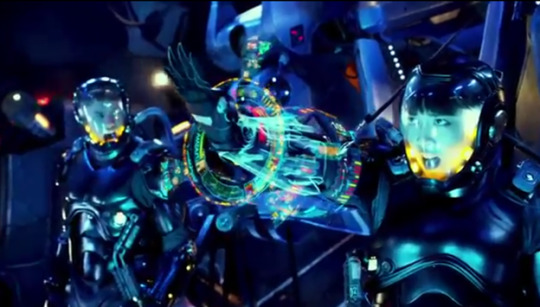
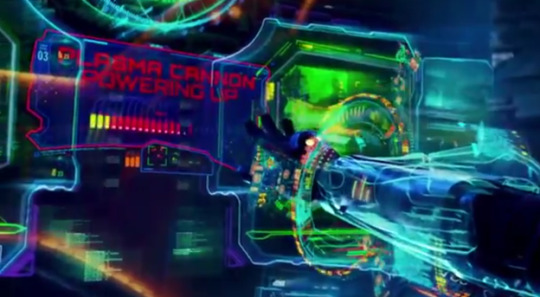
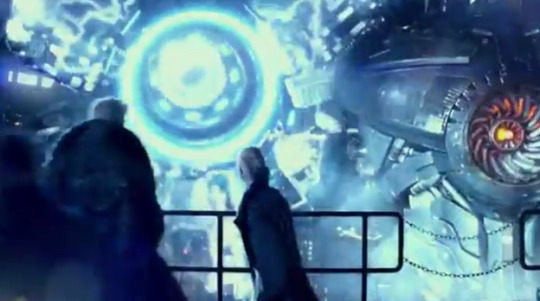
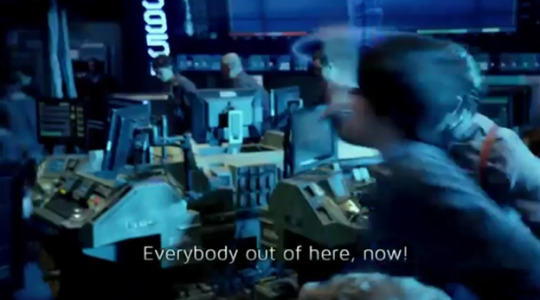
The team has to actually shut down the jaeger to protect themselves from being annihilated.
Upon shaking out of the drift, Mako Mori knows she has validated Pentecost’s fears and judgements about her. She is pretty sure she’s lost her chance to achieve her goals.
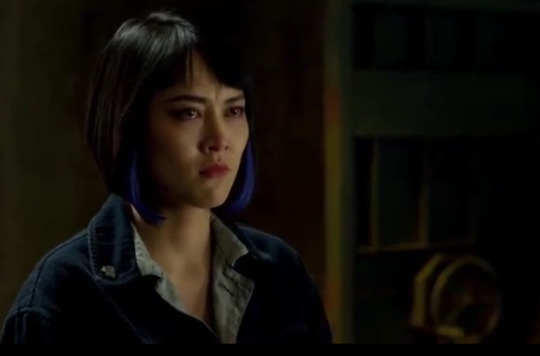
And clearly, her father figure Stacker Pentecost—who does love her and is as such overprotective—has been struggling the whole time with accepting Mori in a jaeger. The standard Toxic Masculinity figure of Chuck Hansen has a hissy fit that Mori is too inexperienced, and he actively tries to get her pushed out too, even accusing Becket of standing up for Mori only because he thinks Raleigh has romantic interest in her.
But it’s Raleigh…this very masculine dude with the somewhat over pronounced man-strut in his step lol, who does something that I really appreciated seeing.
After everything, Becket fights for Mori’s reinstatement when Mori has lost faith in herself and is trying not to break down in shame. And then he sits by her and actively tries to empathize with her about how rough a drift can be.
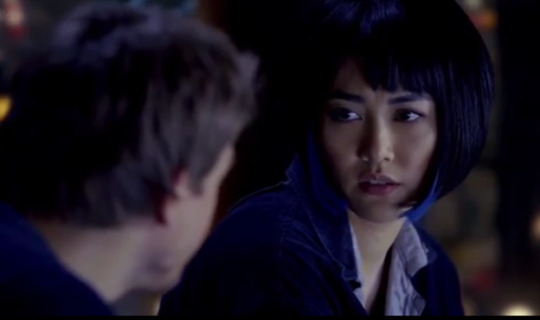
And Raleigh doesn’t do this because he thinks she’s pretty, or because he’s trying to take pity on Mori as some kind of male savior for her weak emotional constitution. This is the guy who is most likely to die first if Mori screws up in real-time, and this is the guy who can acknowledge that he helped set Mori into a no-win situation.
And unlike Pentecost (who initially wants to protect Mori at the cost of her own agency) and Hansen (who believes Mori is too incompetent to function above reproach), Becket knows what Mori was capable of. He believes in her 51 drops, 51 kills simulator score. He believes in her physical and intellectual capabilities based off his interactions with her, which are things that both Pentecost and Hanson immediately forget when Mori fails her first real drift and endangers people.
Becket knew what Mori could do if people just…invested in her and gave her a chance, now that she knew what drifting was like. He saw his own struggles in her and empathized with her as a human being. He takes some responsibility even over the fact that she was not simply made aware of/prepared for what she could face in that drift while also being hooked up to a weapon of mass destruction. Because as we see later in the film, once Mori knows what to expect, she can function very well as a co-pilot.
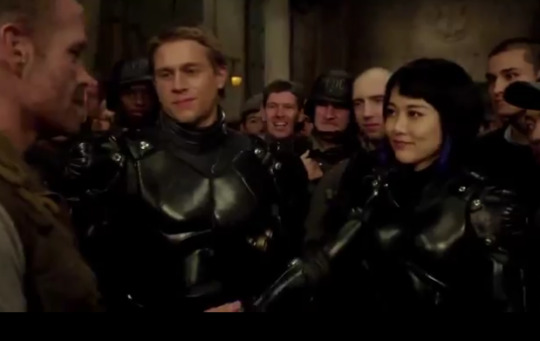
Had Raleigh not believed in her, had Pentecost tried to permanently ground her out of fearful love, and had Mako Mori herself accepted a reality where she was only a failure—the kaiju would have absolutely decimated multiple cities. Because Mori did not remain tied to her initial failure, the resistance lived to fight another day.
The more I thought about the fall and rise of Mako Mori in this 2013 film, the more I really appreciated those moments.
Because if a woman makes a mistake and big-time screws up their debut, it’s usually a death knoll, and even more so if that woman is already living in an environment that makes her a second-class citizen to begin with. People often act like a Chuck Hansen and write her off as incompetent/dangerous, or they pull a Pentecost and assume her to be too weak/too emotional to be of use. There’s not a lot of forgiveness for a woman. Whereas, there’s generally a lot more forgiveness for a man to screw around on the goodwill that he has potential. So it’s pretty rare to see a woman mess up as Mori did, especially in an emotional, traumatized way with such potential consequences…and to see someone still fighting to reach out to her. To empathize with her. To offer her the second chance they knew she could handle.
So it hit me that when the computer in the movie asked, “Drift sequence terminated. Would you like to try again?” and no one answered, Raleigh Becket didn’t have to. Because he had already answered yes, and he had been saying yes for every second he was trying to reach Mori.
And as the movie unfolds, yeah it might be redundant that Raleigh talks to her out loud while they’re fighting. But he takes actual time to warn and prepare her for what they’re facing—because he’s been here before in the real world, and she hasn’t. He’s trying to keep her in the present and to keep himself grounded too so he personally doesn’t bog her down. And it’s in this environment that we see Mako Mori absolutely bloom into one of the best jaeger pilots the world has ever seen, not including that she’s part of the first team to ever single-handedly take down two category four kaiju in one night. And furthermore, we see a Mako Mori who doesn’t just internalize her emotions. She uses those emotions to carry on the fight and to rally Becket to another charge, even when he believes they’re out of options.
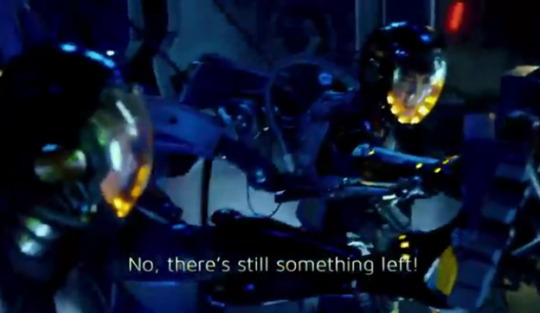
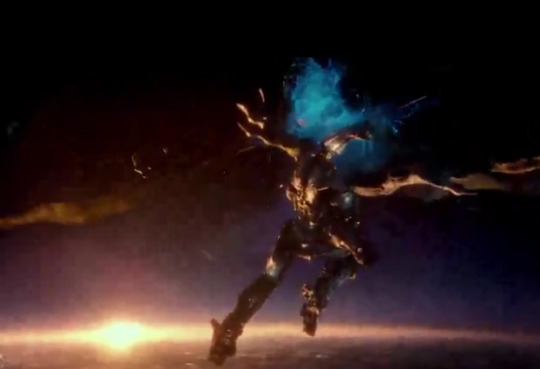
So I guess to wind down this rambling meta, I felt that this wild and fun movie contained some content that, whether intended or not, spoke to me today in a new way I hadn’t seen it as before. I thought it was pretty cool how in this movie, women can rise above a failure and try again, successfully even. The message that men can feel empathy with a woman or understand their struggles is still wildly progressive in today’s world, where it’s more acceptable for women to empathize with men than the other way around. The message that trying to understand helps everyone rise together is lit. And I didn’t really expect to be flailing over this movie and this concept in 2021, but here we are, lol.
#Pacific Rim#Mako Mori#Raleigh Becket#Stacker Pentecost#Chuck Hansen#fandoms#mechas#empathy#failure#gender dynamics#I watched to think about a Voltron AU but got caught up in how I felt Pacific Rim did some pretty cool stuff#some things that i've been craving being in fandoms where if a female character isn't perfect then she's trash#it was really refreshing to return to Pacific Rim because it canonically grapples with that concept and rejects it#it says that a triggered and traumatized woman or an angry woman is valuable#she might even be the one to help save the world#I think Mako Mori and Princess Allura would get along well#BUT ALSO PACIFIC RIM UPRISING DOES NOT EXIST#I REFUSE TO ACKNOWLEDGE THAT MOVIE AS ANYTHING MORE THAN A TERRIBLE FANFIC#but yeah so anyway back to mecha movies and encouragement to try again even if you fail#that sometimes we can't help failing or are set up for failure#but that you can get back up#and try again#and that a failure or a trauma doesn't have to define a person's identity or capabilities#that's how this movie read to me today
206 notes
·
View notes